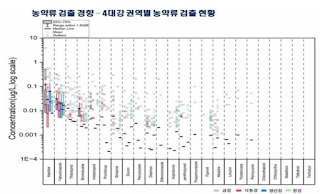Neonicotinoid Pesticides Detected in South Korea's Rivers: A Growing Threat to Bee Populations
A new environmental study has raised alarms about the presence of harmful neonicotinoid pesticides in South Korea's four major rivers— the Han, Nakdong, Geum, and Yeongsan Rivers. These pesticides, which are notorious for their damaging effects on honeybee populations, have been found in significant quantities, yet South Korea's regulations remain far behind those of Europe and the United States.
Pesticides Linked to Honeybee Decline
Neonicotinoids, particularly Thiacloprid and Imidacloprid, were detected in water samples taken from 130 monitoring sites across the rivers. These chemicals are used globally to control insect pests but have been banned in outdoor applications by the European Union due to their detrimental impact on pollinators. Studies have shown that even low levels of exposure to these pesticides can impair honeybees' ability to forage, communicate, and reproduce—leading to massive declines in bee populations.
South Korea’s Regulatory Gaps
While the U.S. and European nations have imposed stringent regulations on these chemicals, South Korea has not followed suit. The country restricts neonicotinoids to certain agricultural uses, but there is no comprehensive limit on their annual usage. This regulatory gap has led to an accumulation of these toxic substances in the environment, posing risks not just to bees but to the entire ecosystem.
Calls for Stronger Oversight
Experts are now calling for more rigorous oversight. Professor Lee Deok-hwan of Sogang University highlighted that while the detected pesticide levels may appear small, their presence in water systems is an indicator of widespread use. Given the persistent nature of these chemicals, they can remain in the environment for extended periods, potentially causing long-term harm to wildlife.
The need for action is urgent. As honeybee populations continue to decline, the ecological and agricultural impacts could be devastating. More research, stricter controls, and public awareness are essential to protect South Korea's natural ecosystems from further damage.
A study has detected neonicotinoid pesticides, known for harming honeybee populations, in South Korea’s four major rivers. Despite restrictions on their use in Europe and the U.S., South Korea has no annual usage limits, leading to concerns about environmental impacts. The study revealed the presence of two neonicotinoid compounds, Thiacloprid and Imidacloprid, in river samples. While some experts downplay their role in bee deaths, others stress the need for stricter regulations to prevent ecological harm. The government’s oversight is seen as insufficient compared to international standards.
FAQs Section:
What are neonicotinoid pesticides?
Neonicotinoids are a class of pesticides that affect the nervous systems of insects, widely used for pest control.Why are these pesticides harmful to bees?
They impair bees' ability to navigate, forage, and reproduce, ultimately leading to colony collapse.How do these pesticides enter the water system?
Neonicotinoids can be washed into rivers from agricultural runoff, wastewater, and industrial facilities.What is being done in other countries to address this issue?
The European Union and U.S. states like California have banned or restricted neonicotinoids to protect pollinators and ecosystems.Is South Korea doing enough to regulate these pesticides?
South Korea restricts usage but does not impose annual limits, which experts believe leaves significant environmental gaps.
#EnvironmentalProtection #PesticidesInRivers #BeePopulationDecline #NeonicotinoidBan #SustainableAgriculture

